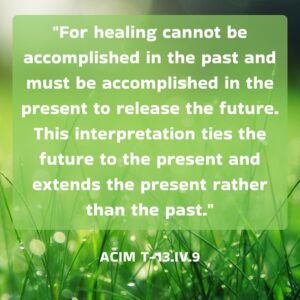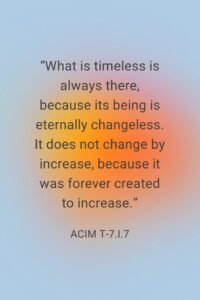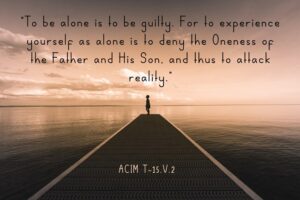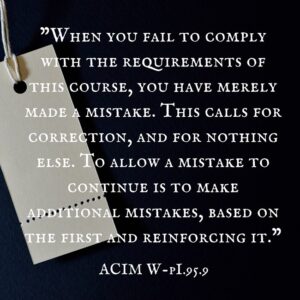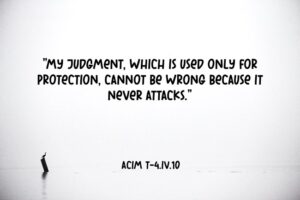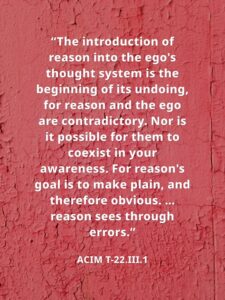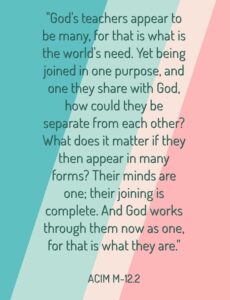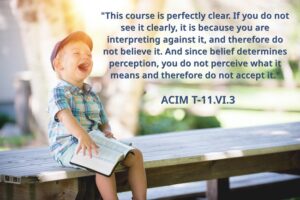
Is ACIM a Metaphor?
Periodically I notice that when students come across a passage from the Course that disagrees with their mindset, they will tell us that it is just a metaphor and it does not mean what it appears to mean. They will often quote this passage from the course:
“Let us not forget, however, that words are but symbols of symbols.” M-21.1
The first thing to note here is that ACIM uses a form of the word “symbol” over 100 times, but how often do you think it uses the word “metaphor”?
Answer: ZERO.
There is a reason for this. A word as a symbol represents a meaning as close as we can get to the real thing whereas a metaphor compares one image to another noting the similarities.
For instance, the word “God” represents our real Creator and is the closest word available to communicate this Being.
On the other hand, the term “Santa Claus in the Sky” is often used as a sarcastic metaphor for God, but is not meant to be a symbol accurately communicating the idea of Him.
The question remaining is this: Since words are symbols does this mean that the message they give us is not reliable?
We should be thankful that this is not the case, for if it where we might as well throw ACIM and other favorite teachings in the trash. While it is true that words often cannot relay the full meaning, that which they do communicate is usually pretty accurate.
Let us take the word “heaven” for example. This represents a state of being that is joyful and peaceful. Even an atheist gets a rough idea of what that would be.
But imagine the added dimension to your understanding of it if you actually experienced it? Then you might say that it is beyond our ability to accurately and fully communicate the experience in words. On the other hand, you would still use the word “heaven” when talking about it because it is the best word we have and gives us the general idea.
The Course backs this up
“As symbols, words have quite specific references. Even when they seem most abstract, the picture that comes to mind is apt to be very concrete.” M:21.2
Concerning the phrase “I want the peace of God” the text says this:
“The world would be completely changed, should any two agree these words express the only thing they want.” W-pI.185.1
Notice it doesn’t say that the words written are a metaphor without understandable meaning, but the meaning is clear enough that just two agreeing on them could change the world.
And why not take the words at face value, for Jesus in the Course says “my words make perfect sense because they come from God.” T-9.IV.4
If the words in ACIM represented some obscure metaphor then they would not “make perfect sense.”
Then we have this: “You have surely begun to realize that this is a very practical course, and one that means exactly what it says.” T-8.IX.8
How could the Course mean what it says if the words are merely obscure metaphors that cannot communicate?
Then we have this as a coup d’é·tat
“you may believe from time to time that I am misdirecting you. I have made every effort to use words that are almost impossible to distort, but it is always possible to twist symbols around if you wish. T-3.I.3
So, how does one “twist symbols around?”
One does this by taking the obvious meaning and telling us that it does not say what it is saying because it is a metaphor.
The bottom line is this:
Yes, words as symbols are imperfect and in the true reality, we will not even need them because communication will be instant and fully realized.
But that is not the case here. In this world words are our primary source of communication and can lead us to awakening if we do not alter their meaning to suit our preconceived notions.
A reader points out that there are numerus actual metaphors used un the Course.
My point wasn’t that ACIM does not use metaphors, for at times it does. But in actually using a variation of the word “symbol” over a hundred times and none for metaphor that it was placing emphasis on the symbolism of words for every word is a symbol of something, but not very word is a metaphor.
When the Course does use a metaphor, it is obvious to the reader that it is not to be taken literally, but then it says many things difficult for the average person to believe that actually should be taken quite literally. For instance, when Jesus said that faith could move mountains many thought it was just symbolic like a metaphor, but the Course sets us straight on this.
“It is hard to recognize that thought and belief combine into a power surge that can literally move mountains.” T-2.VI.9
“Why is it strange to you that faith can move mountains? This is indeed a little feat for such a power.” T-21.III.3.
So it goes with many statements in ACIM that are not obvious metaphors, but difficult to believe. Many will just dismiss them as symbolic and not to be taken literally when the intent was to be taken as written.
To search the website, containing millions of words, replace the word “search” with the word or phrase you want to find and place the entire line in the Google search box.
“Search” site:freeread.com
Join A Course in Miracles Discussion Group on X (Twitter) HERE
Access other articles associated with ACIM HERE
Check out JJ’s books on Amazon HERE
Easy Access to All the Writings
For Free Book go HERE and other books HERE
JJ’s Amazon page HERE
Check out JJ’s Facebook Group HERE
